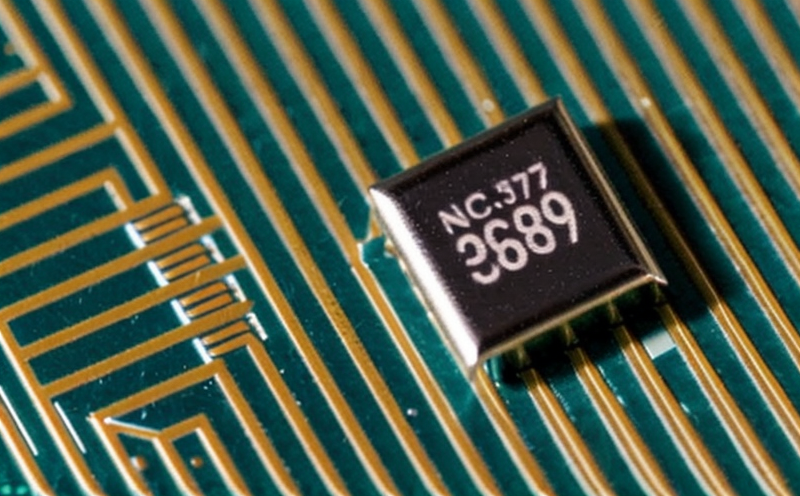ASTM E1461 Thermal Diffusivity by Laser Flash Method Testing
The ASTM E1461 standard specifies a method to determine thermal diffusivity of materials using the laser flash technique. This non-destructive testing (NDT) method is particularly valuable for semiconductor and microchip reliability testing, ensuring that components meet stringent performance criteria under various environmental conditions.
Thermal diffusivity is a critical property in electronic devices as it influences heat dissipation and overall device stability. In the context of semiconductors and microchips, accurate measurement of thermal diffusivity helps predict long-term reliability by identifying potential hotspots that could lead to failure due to excessive temperature gradients.
The Laser Flash Method involves heating a small area on the specimen surface with an intense laser pulse and measuring the resulting temperature rise. This process allows for rapid testing without altering the microchip’s integrity, making it ideal for quality control in production environments. The technique is highly sensitive, capable of detecting very small differences in thermal properties.
For semiconductors, this method helps engineers understand how different materials perform under extreme conditions such as high temperatures and rapid thermal cycling. By comparing test results with the specifications outlined in ASTM E1461, manufacturers can ensure that their products comply with industry standards and are safe for use in demanding applications.
The laser flash method is also useful for evaluating the effectiveness of thermal interface materials (TIMs) used between microchips and heat sinks. These materials play a crucial role in managing heat generation within devices, and any variations in their performance can significantly impact overall reliability. Through this testing process, manufacturers can optimize TIM selection and application to enhance thermal management capabilities.
One key advantage of ASTM E1461 is its ability to provide precise measurements even for thin specimens like microchips, which are often difficult to test using other methods. This precision ensures that the results accurately reflect real-world conditions, enabling more reliable predictions about device performance in various environments.
In summary, ASTM E1461 thermal diffusivity testing by the laser flash method offers a robust solution for assessing semiconductor and microchip reliability. It provides valuable insights into material properties critical for ensuring long-term performance and safety, thereby supporting informed decision-making throughout product development cycles.
Applied Standards
| Standard | Description |
|---|---|
| ASTM E1461 | This standard specifies the procedure for measuring thermal diffusivity of materials using the laser flash method. It covers the setup, calibration procedures, and data analysis steps required to perform accurate measurements. |
| ISO 9728-3 | International standard addressing the measurement of thermal conductivity in thin samples by transient plane source techniques, which can complement ASTM E1461 for more comprehensive evaluations. |
| EN 315 | A European standard providing guidelines on testing the thermal resistance and related properties of insulating materials, useful when assessing TIMs used in conjunction with microchips. |
Why Choose This Test
The ASTM E1461 laser flash method offers several advantages over other thermal testing techniques. Firstly, it provides rapid results without requiring extensive sample preparation or complex setups, making it suitable for high-throughput quality assurance processes in manufacturing environments.
Secondly, the non-destructive nature of this technique ensures that samples remain intact after testing, preserving their usability for further analyses if necessary. This feature is particularly beneficial when dealing with precious or limited quantities of materials like advanced semiconductors.
A third advantage lies in its capability to measure thermal diffusivity across a wide range of temperatures and material types, including those encountered during typical operational conditions of microchips. This versatility allows for more comprehensive evaluations compared to simpler tests that might only cover specific temperature ranges or material groups.
The precision of ASTM E1461 also contributes significantly to reliability assurance by offering reproducible results consistent with international standards. Such consistency builds confidence among stakeholders, including customers and regulatory bodies, ensuring compliance with global quality benchmarks.
Lastly, the ease of integration into existing laboratory workflows makes it an attractive option for facilities already equipped with laser-based measurement systems or those looking to upgrade their capabilities without significant disruption.
Quality and Reliability Assurance
Incorporating ASTM E1461 thermal diffusivity testing into your quality assurance protocols enhances confidence in the reliability of semiconductor and microchip products. This method helps identify potential weaknesses early in the development process, allowing for timely adjustments to design or manufacturing processes.
By ensuring that all components meet specified thermal diffusivity thresholds according to ASTM E1461, manufacturers can extend product lifetimes by preventing premature failures caused by excessive heat buildup. Additionally, compliance with these standards demonstrates commitment to high-quality production practices, which is essential for maintaining market reputation and gaining customer trust.
The data obtained from ASTM E1461 testing supports informed decision-making regarding material selection and process optimization. Engineers can use this information to fine-tune thermal management strategies, ensuring that each component operates efficiently within its intended environment. Furthermore, the continuous monitoring provided by regular retesting throughout production ensures ongoing adherence to stringent quality standards.
Overall, integrating ASTM E1461 into your testing regimen strengthens your position in competitive markets by delivering products known for exceptional reliability and durability. It fosters a culture of excellence that extends beyond individual components to encompass entire systems, enhancing customer satisfaction and long-term business success.





